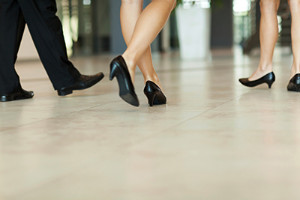
 Bunions, bony bumps on the sides of the feet that often form at the big toe joint, can cause pain or discomfort. This problem is exacerbated by wearing shoes that have excessively high heels, pointed toes, or a fit that is too tight. While you don’t have to give up high heels forever, if you have a bunion, it is recommended that you make changes when it comes to the type of heels you wear and how frequently you wear them. When picking out your shoes, opt for those with a heel no higher than two inches. You should also look for wider shoes that have built-in support and cushioning. Rather than wearing high heels daily, it is recommended that you give your feet a break often, by resting the feet, wearing flats, and doing foot stretches regularly. For more information about bunions, or if you have painful bunions, please consult with a podiatrist.
Bunions, bony bumps on the sides of the feet that often form at the big toe joint, can cause pain or discomfort. This problem is exacerbated by wearing shoes that have excessively high heels, pointed toes, or a fit that is too tight. While you don’t have to give up high heels forever, if you have a bunion, it is recommended that you make changes when it comes to the type of heels you wear and how frequently you wear them. When picking out your shoes, opt for those with a heel no higher than two inches. You should also look for wider shoes that have built-in support and cushioning. Rather than wearing high heels daily, it is recommended that you give your feet a break often, by resting the feet, wearing flats, and doing foot stretches regularly. For more information about bunions, or if you have painful bunions, please consult with a podiatrist.
If you are suffering from bunions, contact Dr. Robert Hope of Riverside Podiatry. Our doctor can provide the care you need to keep you pain-free and on your feet.
What Is a Bunion?
A bunion is formed of swollen tissue or an enlargement of boney growth, usually located at the base joint of the toe that connects to the foot. The swelling occurs due to the bones in the big toe shifting inward, which impacts the other toes of the foot. This causes the area around the base of the big toe to become inflamed and painful.
Why Do Bunions Form?
Genetics – Susceptibility to bunions are often hereditary
Stress on the feet – Poorly fitted and uncomfortable footwear that places stress on feet, such as heels, can worsen existing bunions
How Are Bunions Diagnosed?
Doctors often perform two tests – blood tests and x-rays – when trying to diagnose bunions, especially in the early stages of development. Blood tests help determine if the foot pain is being caused by something else, such as arthritis, while x-rays provide a clear picture of your bone structure to your doctor.
How Are Bunions Treated?
If you have any questions, please feel free to contact our office located in Tuscaloosa, and Fayette, AL . We offer the newest diagnostic and treatment technologies for all your foot care needs.